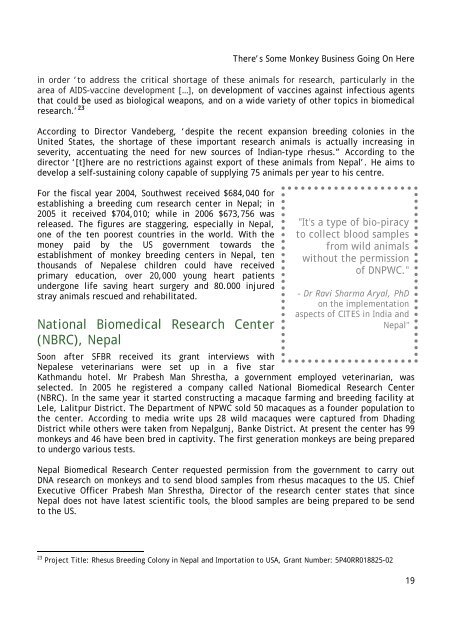Stop Monkey Business Campaign Report - Get a Free Blog
Stop Monkey Business Campaign Report - Get a Free Blog
Stop Monkey Business Campaign Report - Get a Free Blog
You also want an ePaper? Increase the reach of your titles
YUMPU automatically turns print PDFs into web optimized ePapers that Google loves.
There’s Some <strong>Monkey</strong> <strong>Business</strong> Going On Here<br />
in order ‘to address the critical shortage of these animals for research, particularly in the<br />
area of AIDS-vaccine development […], on development of vaccines against infectious agents<br />
that could be used as biological weapons, and on a wide variety of other topics in biomedical<br />
research.’ 23<br />
According to Director Vandeberg, ‘despite the recent expansion breeding colonies in the<br />
United States, the shortage of these important research animals is actually increasing in<br />
severity, accentuating the need for new sources of Indian-type rhesus.” According to the<br />
director ‘[t]here are no restrictions against export of these animals from Nepal’. He aims to<br />
develop a self-sustaining colony capable of supplying 75 animals per year to his centre.<br />
For the fiscal year 2004, Southwest received $684,040 for<br />
establishing a breeding cum research center in Nepal; in<br />
2005 it received $704,010; while in 2006 $673,756 was<br />
released. The figures are staggering, especially in Nepal,<br />
one of the ten poorest countries in the world. With the<br />
money paid by the US government towards the<br />
establishment of monkey breeding centers in Nepal, ten<br />
thousands of Nepalese children could have received<br />
primary education, over 20,000 young heart patients<br />
undergone life saving heart surgery and 80.000 injured<br />
stray animals rescued and rehabilitated.<br />
National Biomedical Research Center<br />
(NBRC), Nepal<br />
"It's a type of bio-piracy<br />
to collect blood samples<br />
from wild animals<br />
without the permission<br />
of DNPWC."<br />
- Dr Ravi Sharma Aryal, PhD<br />
on the implementation<br />
aspects of CITES in India and<br />
Nepal"<br />
Soon after SFBR received its grant interviews with<br />
Nepalese veterinarians were set up in a five star<br />
Kathmandu hotel. Mr Prabesh Man Shrestha, a government employed veterinarian, was<br />
selected. In 2005 he registered a company called National Biomedical Research Center<br />
(NBRC). In the same year it started constructing a macaque farming and breeding facility at<br />
Lele, Lalitpur District. The Department of NPWC sold 50 macaques as a founder population to<br />
the center. According to media write ups 28 wild macaques were captured from Dhading<br />
District while others were taken from Nepalgunj, Banke District. At present the center has 99<br />
monkeys and 46 have been bred in captivity. The first generation monkeys are being prepared<br />
to undergo various tests.<br />
Nepal Biomedical Research Center requested permission from the government to carry out<br />
DNA research on monkeys and to send blood samples from rhesus macaques to the US. Chief<br />
Executive Officer Prabesh Man Shrestha, Director of the research center states that since<br />
Nepal does not have latest scientific tools, the blood samples are being prepared to be send<br />
to the US.<br />
23 Project Title: Rhesus Breeding Colony in Nepal and Importation to USA, Grant Number: 5P40RR018825-02<br />
19


